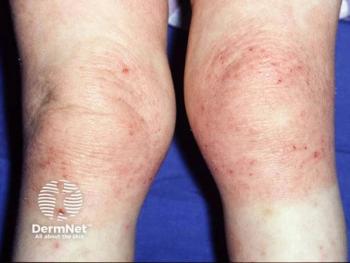
Atopic Dermatitis: Evolution of Care
Andrew Blauvelt, MD, MBA, reviews recent advances in the therapeutic landscape for moderate to severe atopic dermatitis.
Episodes in this series

Andrew Blauvelt, MD, MBA: Over the last 5 years, we’ve seen an incredible expansion of new therapeutic options for patients with moderate to severe atopic dermatitis. This started with a trailblazing drug, dupilumab [Dupixent], several years ago, which is a biologic therapy that targets signaling for IL [interleukin]-4 and IL-13, 2 Th2 cytokines that are critical in AD [atopic dermatitis] pathogenesis. Following the approval of dupilumab, what we’ve seen is a number of different pharmaceutical companies enter the atopic dermatitis space and look at different ways to target this disease. What we’ve had in the last several years since dupilumab is the approval of another biologic that targets IL-13 alone called tralokinumab [Adtralza], and this was approved late last year. And then we have a number of other biologic therapies in late-stage development, and in particular, 1 called nemolizumab, which blocks the IL- 31 receptor, which is the itch receptor. And then another drug called lebrikizumab, which is another IL- 13 blocker. So those are 2 more biologics getting ready to be approved by the FDA [Food and Drug Administration] and coming soon. And then on the oral side, we’ve also seen the approval recently of 2 JAK [Janus kinase] inhibitors, abrocitinib [Cibinqo] and upadacitinib [Rinvoq], just earlier this year, which are also options for moderate to severe atopic dermatitis. Starting with dupilumab, now we have tralokinumab, which is another biologic. And then now we have 2 new oral options for the treatment of moderate to severe atopic dermatitis. What we’ve seen in just a very short time is an incredible expansion of the options for our patients.
Transcript Edited for Clarity
Newsletter
Like what you’re reading? Subscribe to Dermatology Times for weekly updates on therapies, innovations, and real-world practice tips.













